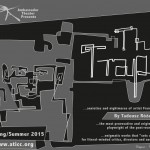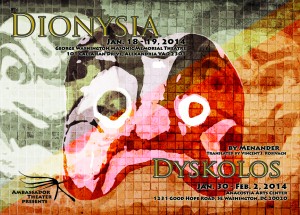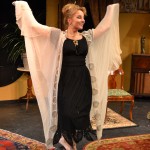
10 QUESTIONS
Take Ten: Hanna Bondarewska

1) What was the first show you ever saw, and what impact did it have?
As far as I remember when I was probably 4 or 5 years old, I saw a children’s show, Hansel and Gretel, with my parents and I remember how involved I was in the whole story. To this day I can recall the role of a witch who scared me so much that I screamed and tried to warn Hansel and Gretel to run away from her. My parents always took me and my sister to see many performances in the theater and took us to the National Theater in Warsaw to watch famous operas and ballet shows. I remember watching all those performances with rosy cheeks and imagining myself on the stage among all the other actors and living in this imaginary world.
After watching all those performances, my sister and I were always imitating the parts we saw on stage at home or outside and we created our own shows. Our home was also a home to many artists, including all of our family and friends. These gatherings were full of songs, poetry readings and dance. From the early days I started reciting poetry and singing, first, in front of our parents, family members and friends and then at school. My parents were our most important critics. They were fabulous teachers who gave my sister and I, our first lessons on how to walk and talk properly. Honesty and imagination was a very big part of our early learning. I still remember walking with a stick under my arms, with a glass of water or books on my head. My granddad would teach me to curtsy, how to walk, sit like a lady, how to eat with a fork and knife and more. All those early lessons helped me significantly later in my education and my acting and directing career.
2) What was your first involvement in a theatrical production?
I started performing when I was in elementary school in all my school’s productions and as soon as I got to High School, I was already performing in a professional theater in Warsaw. One of the most memorable performances was a huge historical performance in celebration of “1000 years of Sandomierz” in Poland, in which I acted as Queen Wanda amongst already well known professional actors. I felt I was on “cloud nine”. This was an unforgettable time of learning from all those professional actors and directors. I was able to perform for an audience of thousands, who came to see this show. I was a true queen going to a battle, carried by two strong soldiers, by my ankles complete in full armor. That was a true adventure, I had to learn a lot about the epoch, style, learn how to fence and keep my body straight while two actors were carrying me and running with me through the entire area full of hills and brick pavement.
3) What’s your favorite play or musical, and why do you like it so much?
Each play I ever acted in was very significant, requiring a lot of research and fun in transforming. But one I will never forget, was the role of Beatrice in Servant of Two Masters by Goldoni. I loved playing that role because it called for transforming Beatrice into a man and then back to a woman in a split of a second. It was a fun comedy in commedia del arte style. I had to practice a lot of fun movements, including fencing with real swords and had to have very quick, with very complex costume changes. The show was a great success and we had to extend the run of the show for 2 years.
4) What’s the worst day job you ever took?
I always tried to find something fun in every job I had to do. The only one that made me quit, was a job selling water filters in Florida. But the reason I quit was because management was trying too hard to sell very expensive units and tried to force me to trick people into getting them.
5) What is your most embarrassing moment in the theatre? There were many funny moments!
I never forget the moment when I was playing the lead character in a children’s show and I was running through the audience with my stage sisters to get on the stage, in a long gown and one of my sisters came too close behind me and stepped on my dress and my dress ripped, oh my God, what an embarrassment! I had to continue running towards the stage, holding my dress so it would not fall down and then i had to sing a love song. I was truly paralyzed but the audience did not even notice.
The other very embarrassing moment was when I was dancing on a huge Performing Arts stage in Florida, among 5 other beautiful dancers. I was dancing to the newest composition, dressed in a leotard with a nice scarf over my hips. After 10 kicks, my scarf came loose and fell down and I could not even pick it up until the very end of the dance. I was frozen inside but had to continue dancing and did the choreography. My acting skills helped me finish in a smooth way and I picked up the scarf as it was intended. My sister was laughing so hard but my niece, maybe 8 years old, felt my embarrassment and said out loud to her mom, “that was not funny mom!”. That made my day!
6) What are you enjoying most about working on They Don’t Pay? We Won’t Pay! By Dario Fo?
The work on that play started last year in early summer when I decided to work on an Italian play and wished to explore a Nobel Prize winner, Dario Fo. As soon as I received the book with the plays by Dario Fo, the play that immediately caught my eye and won my heart was the original play, Won’t Pay! Won’t Pay!. This was one of the plays that when I read it, I laughed so hard and immediately thought of producing it in US. I saw a lot of references to “our current times”, even though it was written in 70s.
I immediately contacted the author’s agency and learned that they do not give permission to the original version anymore, and that Dario Fo rewrote the play in 2008. It was translated into English in 2012. That is the version we are performing now with more updates, that we created while working on it. These modifications were accepted by the author and the translators. I also got a chance to work with Mario Pirovano, the closest collaborator of Dario Fo who came to the US and presented his One man show of Johan Padan and the Discovery of America by Dario Fo. He also led a Master Class for our actors and friends. Thanks to him I was not only able to learn more about Dario Fo and his style, but also meet Dario Fo via skype and see him create. Thanks to Mario, we were able to get a personal video message from Dario Fo about the play and its message. I felt truly blessed to have such an opportunity. Thanks to that process I was also able to implement many of the acting skills into my performance of Antonia in They Don’t Pay? We Won’t Pay!. Also Thanks to this collaboration, I was able to better understand the communication with the audience. I was able to listen more intently and apply that knowledge on the stage.
I love playing the character of Antonia, who tries to find the best way to survive in the world of economic crisis and always find solutions (even if they were not the best ones but portrayed by Dario Fo in a very grotesque-like, humor) to a given circumstance. I also love interacting with my colleague- actors and find new things every time we perform it. I find joy in finding new comedic things and references to our times, thanks to the audience collaboration. I feel like an actor who got so many artistic tools from Dario Fo and now is able to paint, compose and fly!
7) Other than your significant other, who’s your dream date (living or dead) and why?
The only dream date I ever think of is my husband, but if we are talking about dream meeting, then there are many names that come to my mind. Currently while performing in They Don’t Pay? We Won’t Pay!, I dream about meeting in Dario Fo in person, a “Renaissance Man of our Timesâ€. I would love to watch him perform life and participate in an acting workshop led by him. I also would love to visit his art studio where he creates his fabulous paintings. I would love to listen to his inspiring life stories and learn from a master.
![]() What is your dream role/job?
What is your dream role/job?
My dream job is creating a theater that moves the audience, inspire them, provokes and makes them come back to hear more. I dream of a theater that is a home for all creative artists and a great collaborative, inspirational exchange between the artists and spectators. I am always dreaming of a theater that houses international artists whose main goal is to create works that uplift and provoke, educate and inspire the international cultural understanding. I dream of a theater that breaks all borders and brings us all closer after learning about different cultures from around the world.
9) If you could travel back in time, what famous production or performance would you choose to see?
Since I grew up and was educated in Poland, my travels would probably bring me back to my hometown, Warsaw, where I saw several inspiring productions that I would love to see again and again and again. One of the most inspiring ones was Amadeus, directed by Roman Polanski who also played the role of Mozart with one of the most famous actors of our times, Tadeusz Lomnicki, who played the role of Salieri. I never forget the scene in which he transformed right in front of the audience from an old crippled man to a young Salieri. I watched the show 4 times, standing on the steps, there was no seats available. His mastery was unreachable; I never saw any actor in my life who would reach that mastery as Tadeusz Lomnicki. I also saw him in Krapp’s Last Tape by Samuel Beckett in which he was breathtaking.
10) What advice would you give to an 8 year-old smitten by theatre / for a graduating MFA student?
If you are truly serious of becoming an actor, make sure you learn how to use your “heightened senses”- listen, see, smell, taste, be aware of all things around. The process of learning and discoveries never ends! Always master your skills, work on your body, voice and look for inspirations to broaden your artistic vocabulary. Acting is like painting, composing, singing, playing music and dancing, all combined together. You may reach the sky but you may also fall down. Listen to your inner voice and fly.
 HANNA BONDAREWSKA is a Polish-American actor, Artistic director & Founder of the Ambassador Theater. Hanna was recognized by DC Metro Theater Arts as one of the Best Directors 2014 and 2015 for Happily Ever After and for The Trap and received 2013 Helen Hayes Canadian Grant Award among other awards and recognitions. She founded the Ambassador Theater because she believes in the power of theater to change the world for the better through collaboration and artistry. By bringing together theater and diplomacy she hopes to give us all a new perspective as global citizens, which will lead to deeper cultural understanding. “For Hanna Bondarewska, the path to world peace not only exists, she is walking it — one artistic endeavor at a time.†– The Washington Diplomat.
HANNA BONDAREWSKA is a Polish-American actor, Artistic director & Founder of the Ambassador Theater. Hanna was recognized by DC Metro Theater Arts as one of the Best Directors 2014 and 2015 for Happily Ever After and for The Trap and received 2013 Helen Hayes Canadian Grant Award among other awards and recognitions. She founded the Ambassador Theater because she believes in the power of theater to change the world for the better through collaboration and artistry. By bringing together theater and diplomacy she hopes to give us all a new perspective as global citizens, which will lead to deeper cultural understanding. “For Hanna Bondarewska, the path to world peace not only exists, she is walking it — one artistic endeavor at a time.†– The Washington Diplomat.





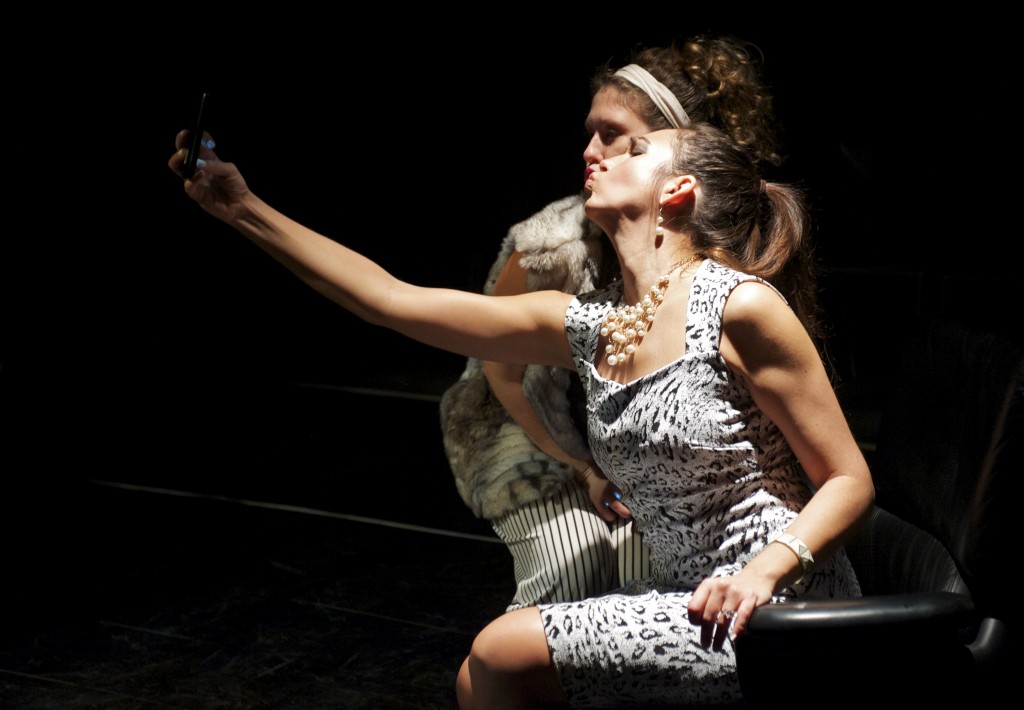
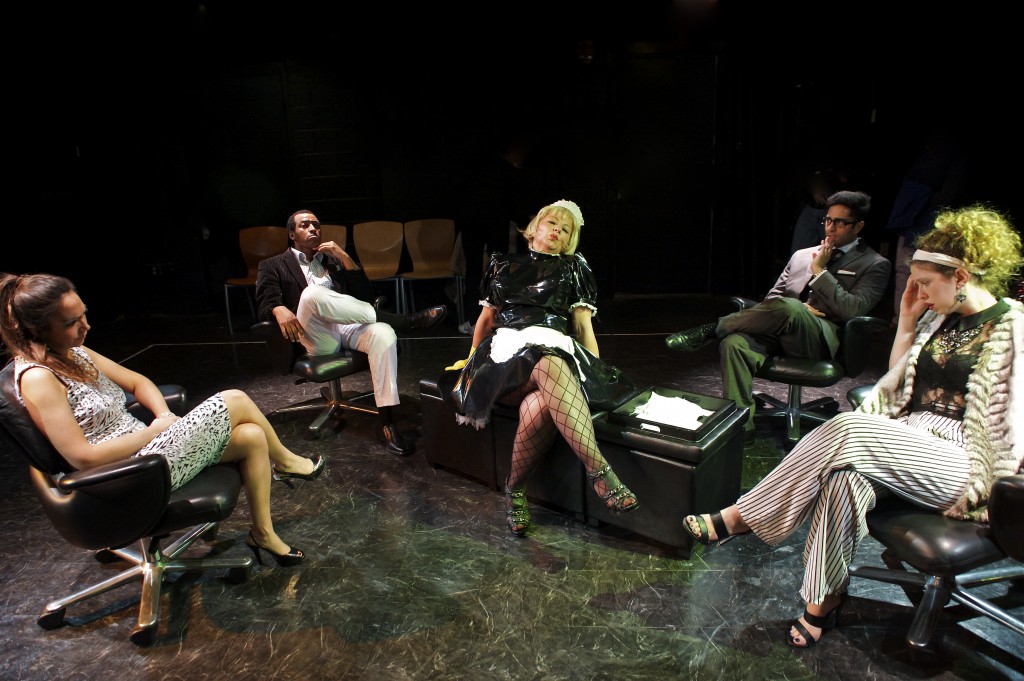

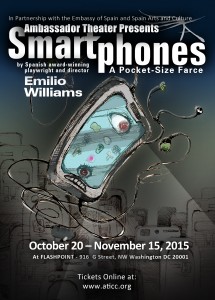


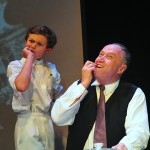

 It’s easy to misunderstand the avant-garde: we come to the theatre expecting a normal story told by actors who are easy to follow, with sets that are exactly what they appear to be. And when a production deviates from the norm we tend to squirm, flip through the program and hope the intermission comes soon so we can split for the bar down the block.
It’s easy to misunderstand the avant-garde: we come to the theatre expecting a normal story told by actors who are easy to follow, with sets that are exactly what they appear to be. And when a production deviates from the norm we tend to squirm, flip through the program and hope the intermission comes soon so we can split for the bar down the block.
